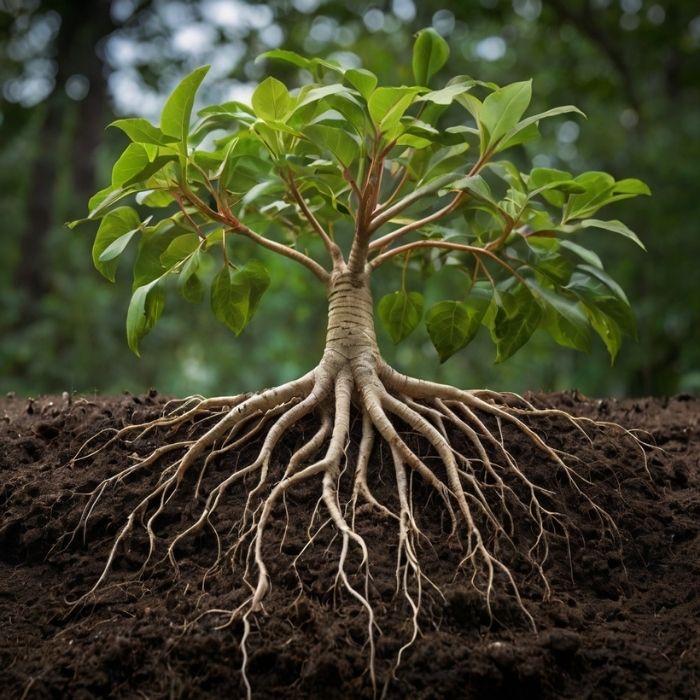Why plant roots aren’t growing?
Healthy root growth is essential for the overall development of any plant. When roots fail to grow or develop as expected, it signals deeper issues in the environment, care, or underlying plant health. In this article, we will explore the most common reasons for stunted root growth and provide actionable solutions to get your plants thriving again.
Understanding the Importance of Root Growth
Roots are the lifeline of plants, responsible for absorbing water, nutrients, and providing structural stability. Without a healthy root system, plants cannot sustain themselves, leading to stunted growth, yellowing leaves, or even plant death.
Top Reasons Why Roots Fail to Grow
1. Poor Soil Quality
Roots require a nutrient-rich and well-draining soil to grow effectively. If the soil is too compacted, lacks nutrients, or has an improper pH level, root growth can become restricted.
Solution:
- Test your soil for pH and nutrient levels using a soil testing kit.
- Amend the soil with compost or organic matter to improve its texture and nutrient content.
- For plants requiring specific pH levels, adjust accordingly with lime (to raise pH) or sulfur (to lower pH).
2. Overwatering or Underwatering
Improper watering is one of the most common reasons for root problems. Waterlogged soil deprives roots of oxygen, while dry soil can cause them to dehydrate.
Solution:
- Ensure the pot or garden bed has proper drainage to prevent waterlogging.
- Water plants only when the top inch of soil feels dry to the touch.
- Use a moisture meter to monitor soil hydration levels accurately.
3. Root Rot and Fungal Infections
Excess moisture often leads to fungal infections like Pythium, which causes root rot. Symptoms include brown, mushy roots and a foul odor.
Solution:
- Remove the affected plant and trim off any rotted roots with sterilized scissors.
- Replant in fresh, sterile soil and reduce watering frequency.
- Consider using fungicides or biofungicides as a preventive measure.
4. Incorrect Planting Depth
Planting too deep or too shallow can hinder root development. When roots are buried too deeply, they may suffocate, while shallow planting exposes them to environmental stress.
Solution:
- Follow the planting depth recommendations specific to the plant species.
- Ensure the crown (where roots meet the stem) is level with the soil surface.
5. Nutrient Deficiency
Roots need a balanced supply of nutrients, particularly phosphorus and potassium, to grow effectively. A lack of essential nutrients often results in weak or non-existent roots.
Solution:
- Apply a balanced fertilizer with a high phosphorus content (e.g., NPK ratio of 10-20-10).
- Incorporate organic fertilizers such as bone meal or rock phosphate to encourage root development.
6. Compacted Soil
Soil compaction reduces air pockets, making it difficult for roots to expand and access oxygen.
Solution:
- Aerate the soil using a garden fork or aeration tool.
- Mix in perlite, vermiculite, or coarse sand to improve soil structure.
7. Pests and Nematodes
Underground pests, such as root-knot nematodes, feed on roots and cause deformities or stunted growth.
Solution:
- Use beneficial nematodes or soil treatments to combat harmful nematodes.
- Rotate crops regularly to disrupt pest life cycles.
- Inspect roots during planting for visible signs of pest damage.
8. Temperature Extremes
Extreme cold or heat can stress plants, causing roots to stop growing.
Solution:
- Mulch around the base of plants to regulate soil temperature.
- Protect plants during frost with covers or by moving potted plants indoors.
- Avoid planting during extreme weather conditions.
9. Transplant Shock
When plants are moved from one location to another, their roots may struggle to adjust to the new environment.
Solution:
- Handle roots gently during transplantation.
- Water immediately after transplanting and keep the soil consistently moist.
- Use a root stimulator to encourage regrowth.
10. Lack of Mycorrhizal Fungi
Mycorrhizal fungi form symbiotic relationships with roots, enhancing nutrient uptake and growth. Without these beneficial organisms, plants may struggle to establish a robust root system.
Solution:
- Add mycorrhizal inoculants to the soil.
- Avoid overuse of chemical fertilizers, as they can harm beneficial fungi.
How to Encourage Root Growth Naturally
- Prune Wisely: Trimming back leaves or stems can redirect energy towards root development.
- Use Root Stimulators: Products containing auxins (e.g., indole-3-butyric acid) promote root formation.
- Apply Organic Mulch: Organic mulch improves soil moisture retention and provides a slow release of nutrients.
- Avoid Overcrowding: Give plants enough space to expand their roots without competition.
When to Seek Professional Help
If root problems persist despite your efforts, it may be time to consult a horticulturist or gardening expert. Persistent issues may indicate underlying soil contamination, severe pest infestations, or improper care practices that require professional intervention Why plant roots aren’t growing . Green Giant Arborvitae

